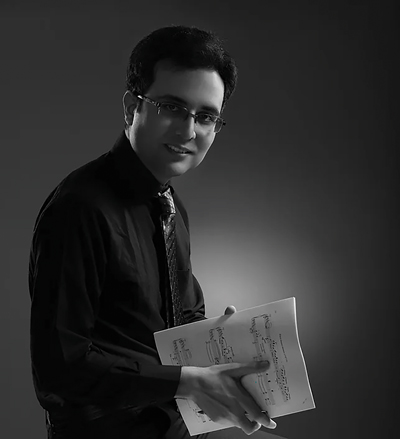Farhad Poupel

- Born: 1993
Farhad Poupel is a UK-based Iranian composer whose works are frequently performed in many prestigious international venues and festivals by today’s leading musicians, including Suntory Hall in Tokyo; La Roque-d’Anthéron Piano Festival, France; Biarritz Festival, France; Janáček Academy of Music and Performing Art, Brno, Czech Republic; and Karlskrona International Piano Festival, Sweden by such distinguished artists such as Peter Jablonski, William Nicholson, Daniel Grimwood, Kotaro Fukuma, Jean-Francois Bouvery, Jeffrey Biegel, Margaret Fingerhut, Catherine Carby, Key Chorale and Portland Youth Philharmonic, and the Windsor (Ontario) Symphony Orchestra. His works have been broadcast on NPR Radio 4, Netherlands.
The critical acclaim his music continues to receive worldwide led to commissions such as Road to Bach for solo piano by Kotaro Fukuma, The Legend of Bijan and Manijeh for piano, choir and orchestra by the Windsor Symphony Orchestra and Jeffrey Biegel, Air and Variations for Clarinet, Violin and Cello with Scarab Club in Detroit, and Dance of the Butterfly and Flame for violin and piano by Margaret Fingerhut and Bradley Creswick.
In his creative work, Poupel is inspired by stories from literary masterpieces from around the world (including the Persian epic The Book of the Kings), poetry, art, mythology and cinema. As a composer, he aims to expand on Sibelius’ organic use of form and thematic relationships, and he is drawn to Ravel’s piano writing. In his compositions, these multi-faceted influences manifest in a coherent, personal and sincere language that transcends cultural boundaries and has both intellectual and emotional appeal for audiences.
Poupel was born in Isfahan, Iran, where he began his musical education by studying the Persian Dulcimer (santur) and piano. He was mentored in harmony, counterpoint and composition by the great Iranian composer Saeed Sharifian and, in 2019, had his international professional debut with Zayande-Rud for string orchestra, performed by the Windsor Symphony Orchestra. His music has been in demand internationally ever since.
Farhad Poupel is currently the holder of the prestigious Global Talent visa which allows him to work on a range of composition projects with the international community of musicians.
Childhood Memories (Persian Suite)
- Composed: 2019
- Premiere: November 12, 2022 by the Portland Youth Philharmonic
- Duration: approx. 12 minutes
Childhood Memories (Persian Suite) started as a miniature overture for the flute choir. The first thing I did after finishing my private composition studies was arrange the famous patriotic song “Oh, Iran” for the Tehran Flute Choir, which was received extremely well—way beyond my expectations. So, I decided to write a small, easy-listening yet sophisticated work for them, inspired by Persian folk music—the miniature overture (which became the first movement of Childhood Memories). My challenge as a composer with this piece was to create an interesting composition based on a simple folk tune with limited harmonic vocabulary.
The first movement sets the groundwork for the whole piece; it includes motives and a theme that will be repeated in the last movement.
The second movement is a lullaby, composed in memory of my grandmother. She had great musical talent and sang beautiful lullabies for me. I used some of the motives that I remember from her. The whole movement is a long melody repeated several times, each one different from the previous and moving to different Persian modes, without changing the tonic center.
The last movement is the climax of the whole work, featuring contrapuntal textures. Up to this point, the composition has been preparing us for this last section, which brings back the heroic theme from the first movement and concludes this hopeful journey.
On the technical side, Childhood Memories is an exercise in how to handle tonality. The first movement handles it in a traditional way, by changing key signatures. In the second, the tonic is always the same, but the mode is different. In the third, the time changes, but the key signature does not.
I tried to come to a simple, colorful, calming and sophisticated work with different layers of structure and related thematic materials. I hope the audience can enjoy the work and especially, create in them a sense of joy, hope and even nostalgia.
Farhad Poupel, 2022